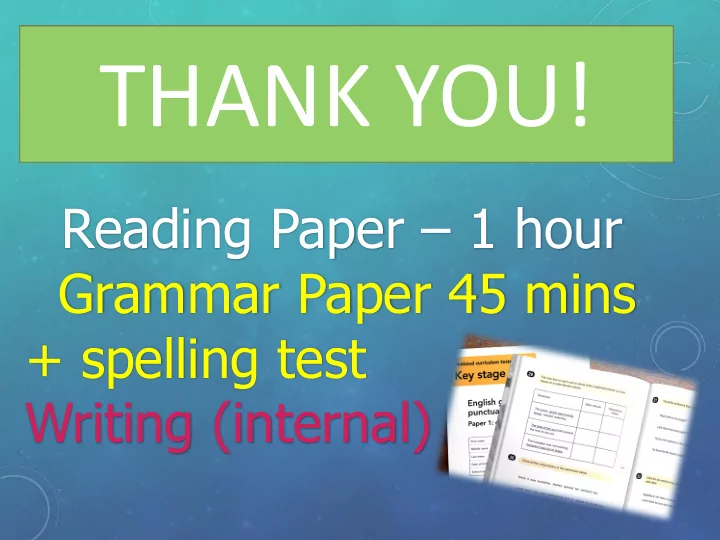

What are the exams my child THANK YOU! will sit for Literacy? Reading Paper – 1 hour Grammar Paper 45 mins + spelling test Writing (internal)
How can I help my child prepare for the READING paper?
Read with your child(ren) and ask questions to develop and strengthen their understanding. HOW? SELECT SYNONYM/ ANTONYM WHY? FIND
NATIONAL VOCABULARY 95% of students nationally got these two questions correct. Only 65% of students in the nation could answer this one. They struggled with explaining. It’s easier to spot and find than explain, so we need to develop this skill.
2 marks and 2 words…explain each word. Use synonyms – word association game. What impression…what do you think.
What else? Read aloud with your child – choral • or echo Homework completion • VIPERS • Reading scheme • Travel time • Author’s Journals • Vocabulary Ninja WoD – L’Hebdo & • Twitter
What else? Take books out of the library together/ read the newspaper together Discuss how the writer • has created a certain view or feeling to what they have created Are parents and siblings reading? • Is reading seen as a non-negotiable • in the home? Read at length – see sample papers
KS2 READING SATS PAPER : WORD COUNT OVER TIME Year Text 1 Text 2 Text 3 Total Pass Mark /50 Gaby to Swimming Encounter 1937 26 2017 the Rescue the Channel with the Sea 602 70 626 Giant Grannie – Albion’s 1488 28 2018 Panda poem Dream 560 214 714 2019 The Park Bees Music Box 2168 28 633 632 903 As this word count analysis shows, the 2019 test comprised of the most words ever presented in a KS2 reading test paper so to prepare we need to consider reading at length more frequently…
How can I help my child prepare for the GPS paper?
Do NOT repeat what is said. USE the word you’re given.
Underline only what you are asked for. Tick the number you’re asked for.
Useful sites for grammar The school website and Facebook feed has lots of grammar guides and links to sites: https://www.grammaraquarium.co.uk/ BBC supermovers – fun songs to help remember key vocabulary Punctuation booklets The punctuation show :
WWW.SPAG.COM - Work through a few questions with your child - Make it a competition – parents could write their answers out on paper - Use Bitesize or Google to help work out the answer (and then a few days later, test that they have remembered what you looked at together) Grammar Police • • Can they proof read for you?
SPELLINGS “I’M AWFUL AT SPELLING…” Test your children on their weekly spellings – practise • regularly! • Websites : how to spell / spellzone /spelling frame • Spelling fun – get creative Have the Curriculum spellings stuck to the fridge • Ask your children to explain what spelling patterns/ • rules they have learnt in class Turn predictive text off •
SPELLINGS
Writing • Teacher assessed • VERY strict guidelines • Moderated ( our sample work can be seen) • Only INDEPENDENT work is considered. • TAF and government guidelines • Biggest hurdle facing students – fitting it all in! • Handwriting
KS1 EXS • Segment spoken words into phonemes and represent these by graphemes, spelling many of these words correctly and making phonically-plausible attempts at others • Spell many common exception words* • Form capital letters and digits of the correct size, orientation and relationship to one another and to lower-case letters • Use spacing between words that reflects the size of the letters.
KS2 EXS • use verb tenses consistently and correctly throughout their writing • use the range of punctuation taught at key stage 2 mostly correctly^ (e.g. inverted commas and other punctuation to indicate direct speech) • spell correctly most words from the year 5 / year 6 spelling list,* and use a dictionary to check the spelling of uncommon or more ambitious vocabulary • maintain legibility in joined handwriting when writing at speed Joined handwriting also improves spelling and grammar.
INTERVENTION & QL ANALYSIS
Recommend
More recommend